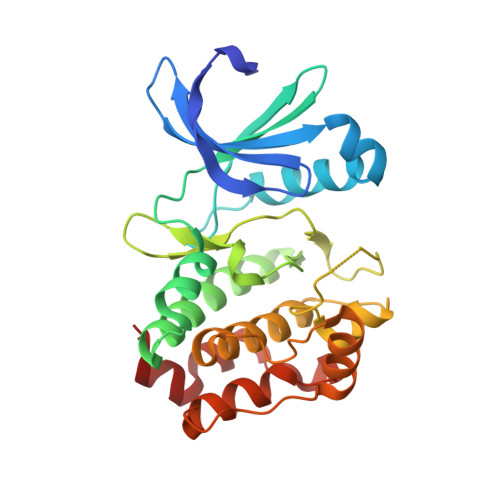Selective Aurora A-TPX2 Interaction Inhibitors Have In Vivo Efficacy as Targeted Antimitotic Agents.
Stockwell, S.R., Scott, D.E., Fischer, G., Guarino, E., Rooney, T.P.C., Feng, T.S., Moschetti, T., Srinivasan, R., Alza, E., Asteian, A., Dagostin, C., Alcaide, A., Rocaboy, M., Blaszczyk, B., Higueruelo, A., Wang, X., Rossmann, M., Perrior, T.R., Blundell, T.L., Spring, D.R., McKenzie, G., Abell, C., Skidmore, J., Venkitaraman, A.R., Hyvonen, M.(2024) J Med Chem 67: 15521-15536
- PubMed: 39190548
- DOI: https://doi.org/10.1021/acs.jmedchem.4c01165
- Primary Citation of Related Structures:
8C14, 8C15, 8C1D, 8C1E, 8C1F, 8C1G, 8C1H, 8C1I, 8C1K, 8C1M - PubMed Abstract:
Aurora A kinase, a cell division regulator, is frequently overexpressed in various cancers, provoking genome instability and resistance to antimitotic chemotherapy. Localization and enzymatic activity of Aurora A are regulated by its interaction with the spindle assembly factor TPX2. We have used fragment-based, structure-guided lead discovery to develop small molecule inhibitors of the Aurora A-TPX2 protein-protein interaction (PPI). Our lead compound, CAM2602 , inhibits Aurora A:TPX2 interaction, binding Aurora A with 19 nM affinity. CAM2602 exhibits oral bioavailability, causes pharmacodynamic biomarker modulation, and arrests the growth of tumor xenografts. CAM2602 acts by a novel mechanism compared to ATP-competitive inhibitors and is highly specific to Aurora A over Aurora B. Consistent with our finding that Aurora A overexpression drives taxane resistance, these inhibitors synergize with paclitaxel to suppress the outgrowth of pancreatic cancer cells. Our results provide a blueprint for targeting the Aurora A-TPX2 PPI for cancer therapy and suggest a promising clinical utility for this mode of action.
Organizational Affiliation:
Medical Research Council Cancer Unit, University of Cambridge, Cambridge CB2 0XZ, U.K.





















